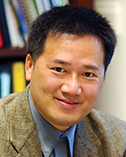
Xing-Wang Deng
Peking University
|
Primary Section: 25, Plant Biology Secondary Section: 62, Plant, Soil, and Microbial Sciences Membership Type:
Member
(elected 2013)
|
Biosketch
My laboratory research centers in two areas. One is the genetic, molecular and biochemical mechanism for light regulated seedling development in Arabidopsis, ongoing for the last 22 years under the NIH support. We have discovered a dozen pleiotropic COP/DET/FUS loci responsible for mediating light control of seedling development. Their encoded proteins constitute three protein machines involved in targeting photomorphogenesis-promoting factors for degradation by the 26S proteasome, in response to external stimuli. From time to time in the past, new aspects derived this NIH funded program were assisted by additional funds from NSF and other sources. Another research area is a relative new and an endeavor in last ten years, genome-wide analysis of the relationship between epigenetic modifications and chromatin structure/gene expression in maize, rice and Arabidopsis, and using those genome wide platforms to understand genome basis of the plant heterosis. The genomic platforms developed here have critically helped my lab to taking advantages of the genome approaches in my NIH funded effort on light control of development.
Research Interests
Over the last twenty years of independent research career at Yale University, Prof. Deng's research mainly centers on the molecular and biochemical mechanism for how light regulates plant development. Using Arabidopsis model, his group has identified a dozen of pleiotropic COP/DET/FUS loci responsible for mediating light control of plant development. They further demostrated that those COP/DET/FUS genes encoding proteins constitute three protein machineries involved in targeting photomorphogenesis-promoting factors for degradation by the 26S proteasome, in response to external stimuli. Two of those complexes defined two novel multiproetin complex E3 ligases (COP1 complexes and CDD complex) and the other is the well-conserved COP9 signalosome, a general eukaryotic Cullin-based E3 ligases regulator with de-rubbylation activity. Professor Deng lab are now applying both molecular/genetic and genomic approaches to further analyze the action mechanism of those novel cellular machineries, which are conserved among all multicellular organisms. Those discoveries made in plant model in Deng lab has significant implications in general biology research as well as those studies relationg to human health. Recently work from many groups including Deng lab have show the general conservation of those three complexes in all multicellular organism and their fundamental roles in a variety of developmenal and cellular processes. Over the last few years, Deng lab has initiated another area of research: genome-wide analysis of the relationship between epigenetic modifications and chromatin structure/gene expression in rice and their role in rice heterosis. Deng lab has established several genomic platforms to examine the molecular and genomic basis of rice heterosis.

